056 – The Mind of Evil
Steven B is a writer at Kasterborous Doctor Who News and Reviews - All the latest Doctor Who news and reviews with our weekly podKast, features and interviews, and a long-running forum.
This is the one where: The Master becomes a Crime Lord, takes over a prison, and attempts to steal a missile and start World War III; Jo gets trapped in with a gaol full of rioting prisoners and saves the day with kindness; UNIT organise the security for an international peace conference, as we meet Corporal Bell for the first time; and the Doctor fights an alien parasite that feeds on the evil impulses of the mind.
The Mind of Evil contains almost all that is good – and evil – about the Pertwee period of Doctor Who. On one hand, it gives us the Master and the Doctor locked in a meaningful and coherent battle of wits relative to Saturday teatime viewing, the extended UNIT family all get a lot of cool stuff to do, and there’s an alien menace that has come to take over the Earth in what looks and feels like the glam and campy 1970s and, by Season 8, probably is, while still retaining evidence of ‘grittier’ echoes of the ‘one minute into the future’ schema more associated with Season 7.
On the other, the implicit philosophy of the Keller Machine unpopularly suggests that there is not only a dark impulse within humans but that this can be isolated to what distils down to a genetic level. The everyday implication of this theory of behaviour and of the mind is that some people are just born evil and there’s nothing that we can do about it – apart from ‘curing’ them of their evil impulses by a nameless extra-terrestrial parasitic monster.
It’s certainly an unsettling idea, essentially highlighting an uncomfortably old biblical and perhaps even Manichean understanding of Evil, and Good for that matter, which is far removed from an ‘it’s all good’ Hegelian Idealism and a Nietzschean ‘beyond good and evil’ weird mix that are – in a very ‘rough guide’ kind of way – the antecedents to our more native postmodern philosophical frameworks.
There is also, from a post-colonial point of view, the very problematic representation of the Chinese and female characters in the story, most especially that of Chin Lee, but that may almost be expected of as pre-multicultural and feminist-reluctant a production context as 1971.
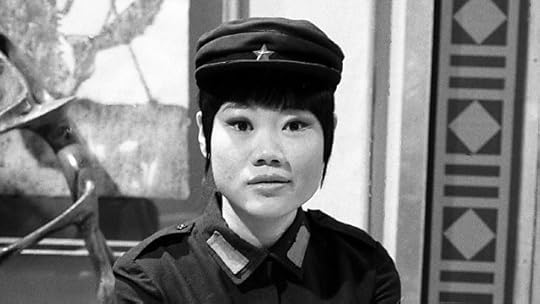
Evidence of this unthinking Euro-centrism most obviously comes to hand in a barely believable Holmesian moment, as the Doctor wildly conflates the presence of Chin Lee as to mean she is the only ‘Chinese girl’ in the whole of London, before her character is represented as a stereotypical femme fatale with all of the Fu Manchu cunning of the Orient as evident in her assassination of Senator Alcott, the American ambassador who is lured to an otherwise empty hotel room late at night. Chin Lee’s rather patriarchal duality is completed when, in an earlier scene, she serves as the docile bidder of commands to the Master’s dominant western male, all of which now feels at least a little icky.
The representation of the Chinese delegate, Mr Fu Peng, is similarly troubled, though not quite to the same extent. While the exchange between Fu Peng and the Doctor in the delegate’s native Hokkien seems more than a little condescending to modern critical eyes, it’s also admittedly probably as much of an insight into cultural relativism as the time would likely have then allowed.
It’s arguable that his peak as a character of true malignance in the series can be chartered to the end of Episode Three, where the Master seems more in control of any situation he has created for himself on Earth than we have ever seen him, and when he is finally on an equal power footing with the Doctor, if not better.
The sidelining and outright snubbing of the authority army-figure of the Brigadier by Fu Peng, however, in favour of a chatty ambassadorial dialogue between Fu Peng and the much-travelled and seemingly Chinese-literate Doctor also serves to underscore a more progressive favouring on Beijing’s part of diplomacy over death, while simultaneously adding bit of Pertwee charm to proceedings.
It’s not certain, however, whether Pertwee plays the at-best-dubious claim that he has essentially befriended Mao Tse Tung with the ambivalent impish intent to ingratiate himself with the delegate with which it was most likely written, opting for a more standard aristocratic Third Doctor demeanour instead that basically comes across as rather arrogant. I can imagine Hartnell calling Fu Peng’s bluff and Troughton using the trick to gain his confidence in their respective, imagined playings of this line, but Pertwee doesn’t seem to have here entertained the idea and it’s played as if the Doctor did actually befriend a man whose place in history is – well, I’ll leave it for you to decide.
Until recently only available in black and white, there’s actually something to be said about The Mind of Evil benefiting from a more film noir look that the monochromatic print offers instead. With most of the audience of the time watching it on old black and white television sets, we’re probably more in tune with how the whole thing felt at the time for one thing.
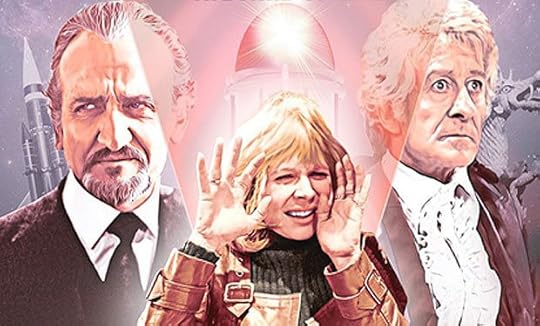
The sets and action resultantly fit in with a rather more Manchurian Candidate cold war discourse that maybe elevates the serial from having at least a certain equivalence to the BBC’s own Porridge, after all. The white noise and psychedelic visuals of the aforementioned Alcott death scene take on distinctly Soviet brainwashing techniques, again reaching back to The Ipcress File, as does the cat and mouse scene between Benton and Chin Lee in the streets of London, which are reminiscent of the scene of Michael Caine’s Harry Palmer stalking Jay in and around the British Science Museum Library before eventually allowing him to get away after being physically overcome. The final episode’s helicopter sequences, while notorious for blowing the budget such that Timothy Combe would sadly be banned by Letts from directing Doctor Who again, further give a strong element of slick Sixties spy-fi to the series.
The later scenes of the prison being taken back by UNIT (with thanks to Havoc! as well as the British Army) also add to this effect. Benton’s group entering through the tunnel underneath is well shot, all high angles and fast cutting. UNIT really do save the day here, though the brutality of the shoot-out is a little more than cartoon violence allowable for family viewing at times, with the camera angles used particularly effective in affecting the immediacy of the raid for both sides. Accordingly a question that is raised throughout the narrative is again raised here: Does one have to partake in some evil in order to do good? On this evidence one sadly must, but there is always another way…
The real star of the show, and one of the reasons why The Mind of Evil works on a variety of levels despite some of its admitted flaws, is Roger Delgado as the Master. In a longer time than we might anticipate since The Terror of the Autons, the Master seems to have built himself an impressively criminal means by which to enact his next great plan. Wearing the same suit as we last saw him, now complete with ostentatious fur-lined overcoat and a lawyer’s briefcase while puffing on a cigar, we see him pulling the webs of intrigue in the back of a chauffeured limousine.
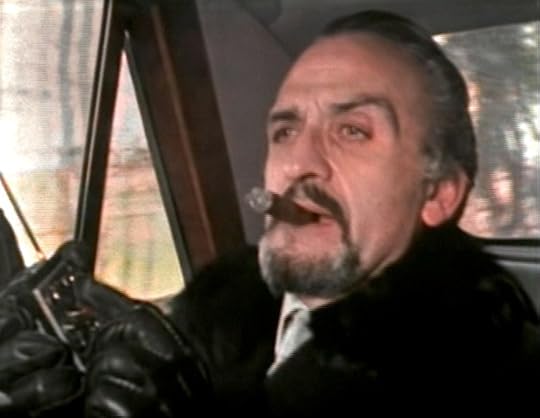
It is the very image of a Doctor Mabuse-styled Napoleon of Crime, and it works so well against the context of the Doctor having allied himself with the full force of the authorities. There’s something of a lost opportunity to explore and watch this Macavity dynamic evolve further in future stories, retreating to the illustration of the Master as more of a rogue element than an insidious presence that has infected the systems and structures of modern-day Earth (which we see fleetingly over the course of Series 3). The scene of the Master being chauffeured through the gates at Stangmoor after having falsely established his credentials as Professor Emile Keller as part of a long game (the Keller Machine was built about a year before the events of The Mind of Evil kick off) are perfect in giving us more of a clue as to how this might have panned out had this Crime Lord portrayal continued. If only it had.
The Master’s double plot of first harnessing the required ‘evil’ within the confines of the Keller Machine before unleashing this hate on the international peace conference as well as kidnapping the nuclear-powered nerve gas Thunderball – erm, I mean Thunderbolt – missile seems both elaborately Doctor Who as well as suitably near the plan-within-a-plan schemes the Master has up his sleeve when on his best form – even if those plans aren’t always entirely logical (aka ‘elaborately Doctor Who’) in nature.
The central protagonist against the Master’s lead here is not the Doctor, however; it is Jo Grant. Inexplicably left behind at Stangmoor by the Doctor before a riot breaks out, Jo actually goes on to single-handedly turn the tide in the favour of the Governor’s guards and restores order to the land.
It’s arguable that his peak as a character of true malignance in the series can be chartered to the end of Episode Three, where the Master seems more in control of any situation he has created for himself on Earth than we have ever seen him, and when he is finally on an equal power footing with the Doctor, if not better. “Now I’m ready for you”, he menacingly declares with reference to the Doctor after he has assumed control of the entire prison before the following showdown in the Governor’s office where the Master now sits in his throne, subverting the roles of establishment and criminal, all while in an opulent office complete with beautiful antiques.
Bizarrely, however, the Master now diverts his attention to the Thunderbolt missile. Why? So that he can plunge it into the peace conference and Earth by extension into World War III. I guess it kinda works on a general scale of audacious villainy that we want to see out of this extraterrestrial version of Moriarty, even if it doesn’t make total sense, and despite a good escape set piece, the Doctor quickly ends up back in the processing room at the hands of the Master, handcuffed to a chair before his mind is attacked by the Keller Machine.
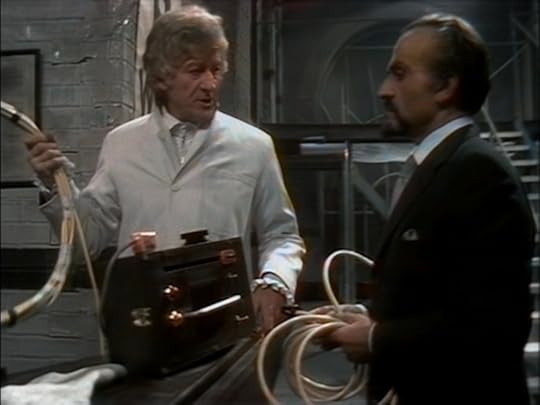
The Master, operatically flicking switches and turning dials, has won – but he then inexplicably excuses himself. Unwilling to stay to see his arch-enemy destroyed in the most agonising way by the machine he himself has built, the Master leaves the room. Bizarre indeed, when you consider that he will go on to regularly delay killing the Doctor in order that he may do it in as best fitting a manner and opportune a moment as possible. Surely, it would have been perfect for the Master to leave him there, laughing maniacally in triumph as the Pertwee Doctor gurns for the second of three cliffhangers? Indeed, it’s hard not to argue that, if this were a four parter, it would have been a perfect ending before the final resolution episode.
So, how is this resolved? How does the Master effectively abdicate from a position of ultimate power that we probably never actually see him in again until, what – maybe Logopolis? Sadly, in a way that we have already seen and that will cause great damage to the role of the Master as the Doctor’s Moriarty going forward; by the Master’s plan having a fatal flaw, to wit – the alien presence goes beyond his measures of planned control.
And, more importantly, because the Master cannot actually bring himself to kill the Doctor.
This extends so far in that the Master even resurrects the Doctor’s failed heart, curiously ordering lead thug Mailer out of the room before doing so, perhaps as he performs some secret Time Lord version of CPR. In addition, the Master, it turns out, again struggles to control an alien force that he seeks to use for world conquest, which again turns on him this time by projecting his greatest fear.
And what is his greatest fear? What else could it be? The Doctor, in enormous form, standing over him, belittling him, laughing at him mockingly, in triumph. The Master’s response is to just run away, in an attempt to starve the parasite into subservience. He has already utterly lost control, and we’re a full eight minutes on from a moment when his vantage point looked entirely unassailable – and in truth it’s a moment from which the Master as a character and a first rate nemesis to the Doctor probably never really recovers.
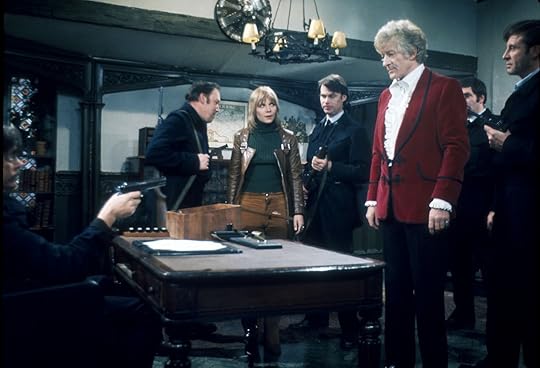
Nonetheless, it provides for a really good set piece in the form of the Doctor and the Master shortly afterwards working together to prevent the creature from teleporting itself. A jerry-rigged nonsense with a lasso that the Doctor struggles to place over the parasite’s upright casing and the Master fiddling at a box with flashing lights provides for an iconic image.
This working together to stop the alien getting out of hand is still a fresh image it must be remembered, and one that in truth works better here than as previously in The Terror of the Auton’s finale, which is hallmarked by a much-too-quick change of heart on the Master’s behalf against the Nestene Consciousness as to be narratively plausible after four parts of plotting. Here, the creature goes from being utterly under his control to threatening his own existence, and working alongside the Doctor doesn’t mean that the Master has entirely abandoned his own nefarious plans.
The central protagonist against the Master’s lead here is not the Doctor, however; it is Jo Grant. Inexplicably left behind at Stangmoor by the Doctor before a riot breaks out, Jo actually goes on to single-handedly turn the tide in the favour of the Governor’s guards and restores order to the land. There’s a rather uncomfortable realisation that any woman in such an environment would probably in real life never have been given such a chance when locked up with hundreds of desperate armed men, but in the world of family television, we’re spared this sickening thought as the narrative instead allows Jo to save the day all while being her good self.
In fact, Jo’s best moments in this story are alongside the agreeable Professor Summers (Michael Sheard everyone – hurrah!) and the now saintly Barnham, to whom she affords the kind of human courtesy the characters deserve but do not get to any great degree from the regular cast. In her dialogue with the professor, Jo is able to come to an understanding of what the machine does and how it affects its ‘patients’, consequently showing a level of apprehension about the Keller process that anyone that values free will should.
Despite this horrific change, analogous to the lobotomies performed on inmates in the even crueller past, Barnham’s characterisation elicits an immensely sympathetic response, with Neil McCarthy excellent in playing with such nuance the sweet lumbering oaf of a forced pure heart.
But it’s in Jo’s interactions with Barnham that we see the truth of Morrissey’s insistence that it takes strength to be gentle and kind. Never patronising, Jo seems to acknowledge the value of the character as a human while simultaneously looking after him as perhaps a teacher would a child, elevating the dignity of the innocent and the good inherent in both in a story set amongst the villainous and the violent. This is The Mind of Evil’s counter-point to the old Jesuit oath that the ends justifies the means; namely, only light destroys the dark.
Odd moments of charm aside – see, specifically, “My dear Lethbridge-Stewart, you only need to ask. Your word is my command” followed by “Cheshire Cat, Mr Yates, Cheshire Cat…” – the Doctor is alarmingly and disappointingly abrupt here. Having initially accessed the era of the Third Doctor through my primary school’s library – and consequently and naturally falling in love with its characters, setting, style, premise, and iconography – I was later surprised to see for myself how my impression of this Doctor as derived from musty-smelling sticky-backed cellophane-bound Target paperbacks differs from the large reality of his actual screen performance.
It’s not that Pertwee is always brusque and unapproachable; there are always moments to redeem the portrayal like the ones listed above. It’s more so that there are even more scripted opportunities to further endear the silliness and the kindness of this Doctor that aren’t taken up as Pertwee instead opts for a more straight, even at times arrogant, delivery. I guess I want to believe that this tall, white-haired Doctor dressed in a velvet smoking jacket and frilled shirt with bow tie is a kinder, more courteous man than he probably is.
Where the Third Doctor’s inability to adequately relate on a humane level with other characters most obviously shines through is in his dealings with Barnham; the first victim of the Keller Machine that we see during this story. The machine effectively turns Barnham – at first portrayed as a screaming, violent thug – into an idiot savant, except largely without the savant bit.
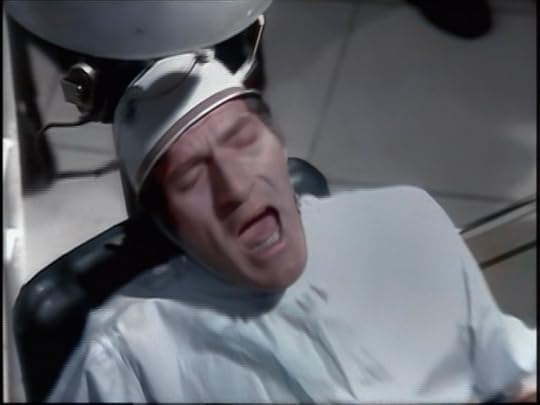
Despite this horrific change, analogous to the lobotomies performed on inmates in the even crueller past, Barnham’s characterisation elicits an immensely sympathetic response, with Neil McCarthy excellent in playing with such nuance the sweet lumbering oaf of a forced pure heart. The explanation to Jo of his conversion by Professor Summers that what he is now “depends on how you look at it: an idiot – or a saint” is a clear key to understanding how we are encouraged to respond to him as a character. Further, despite being a lesser light in the story, he is given more than enough by 1971 standards to win our sympathies as an audience.
Take, for instance, a moment later on in the story, when the Doctor and Jo are menaced by the Keller Machine but are inadvertently rescued by Barnham’s innocence. So we have the machine and our friend Barnham, and there is a brief moment when the Doctor treats him with such unaccustomed kindness that McCarthy as Barnham flickers with great deft a smile in recognition of this wonderfully humane act, as though validated even if he is probably merely patronised. It’s heartbreaking and beautifully acted, and in that moment I can recognise my Third Doctor, borne of childhood interpretations of Terrance Dicks’ novelisations.
But it is all too quickly undone, and not merely by the pace of the narrative and the rush to impending doom as we near the climax, but by Pertwee’s delivery at the end of the “How do you think I feel?” line. This, remember, comes after Barnham is cruelly run down by the Master making his escape in a van after he allowed both the Doctor and Jo to get close enough to the alien parasite so as to be able to defeat it in the first place. It’s the sheer severity of the delivery of the line after the tenderness with which Katy Manning delivers her own line of mourning that destroys a real moment of kindness, and which all means that Barnham’s sacrifice isn’t properly noted when it should have been sung.
It’s heartbreaking and beautifully acted, and in that moment I can recognise my Third Doctor, borne of childhood interpretations of Terrance Dicks’ novelisations.
Instead, the whole matter of Barnham is abruptly forgotten in the ensuing phone call with the Master and there’s a jokey end between Benton, the Doctor and the Brigadier. Jo, as the first and really only one to remember the idiot saint, is present in the room but has the focus shifted away from her very quickly indeed.
It’s a shame: Jo and Barnham are the two hearts at the moral centre of this story, providing a stark counter-balance to the seeming lesson of this story that, in order to do good, one must occasionally engage in evil. Perhaps it’s emblematic of the unkinder side of this Doctor that they are sidelined at this moment in favour of the Pertwee’s Doctor typically getting the final line.
The tensions, though, serve for all their shortcomings to summarise the Pertwee Doctor and era as a whole; as a mixture of both good and bad, glam and grit, kindness and arrogance, of violence and peace. This really is one of my favourite Pertwee stories amongst many, and I want to make it clear that this period of the show’s history is as close to my heart as almost any other.
But on such evidence as this there’s always something there, contradictory and mean, that detracts from my overall high enjoyment of Pertwee’s stories, scratching away at the back of my thoughts. Maybe it’s my own mind of evil.
The post 056 – The Mind of Evil appeared first on Kasterborous Doctor Who News and Reviews.
Christian Cawley's Blog
- Christian Cawley's profile
- 4 followers



